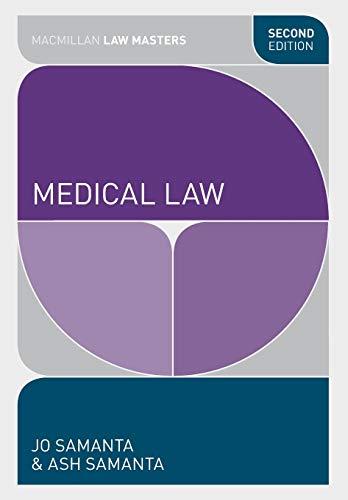Question
Sandra Hughes is a reporter for the Los Angeles Times . She was assigned to cover the murder trial of Robert Blake. The film and
Sandra Hughes is a reporter for the Los Angeles Times. She was assigned to cover the murder trial of Robert Blake. The film and television star was charged with killing his wife, but surprisingly was found not guilty by a jury. Hughes gathered a great deal more information while covering the case than was ever published in the Times. After the trial ended she wrote a non-fiction book about the case, The Blake Mystery Solved. In the book she contends that there was more evidence against Blake than the prosecution presented at the trial, but that the district attorney chose not to include this evidence because it would have compromised the identity of an important police informant. Prosecutors believed that they had sufficient evidence to win the case without this additional evidence. The Warner Bros. film studio contacted Hughes about using her book as the basis for a film about the case, starring Ashton Kutcher in the Blake role. Hughes liked the idea, but didn't like the offer of $500,000 for the rights to the book. She wanted an even million. Warner Bros. went ahead and made the film anyway, using the book as the basis for important parts of the script--including the material about the additional evidence that was never used. They used a lot of her ideas about the case, but the script was totally different from the prose she wrote for the book. They credited Hughes' book at the end of the film but paid her no money. Hughes sued for copyright infringement, claiming the studio stole her work. She said she worked for more than a year on the book, and deserves fair compensation for her efforts. Warner Bros. makes two arguments in its defense. First, it argues that the film was a fair use of the material in the book. Second, they argue that the material the studio used for the film is not protected by copyright.
A. Outline the four criteria used by the courts to determine whether a use is a fair use or not.
B. Does the studio need to raise the fair use defense? Why or why not.
C. Who will win the case and why?
Step by Step Solution
There are 3 Steps involved in it
Step: 1

Get Instant Access to Expert-Tailored Solutions
See step-by-step solutions with expert insights and AI powered tools for academic success
Step: 2

Step: 3

Ace Your Homework with AI
Get the answers you need in no time with our AI-driven, step-by-step assistance
Get Started


